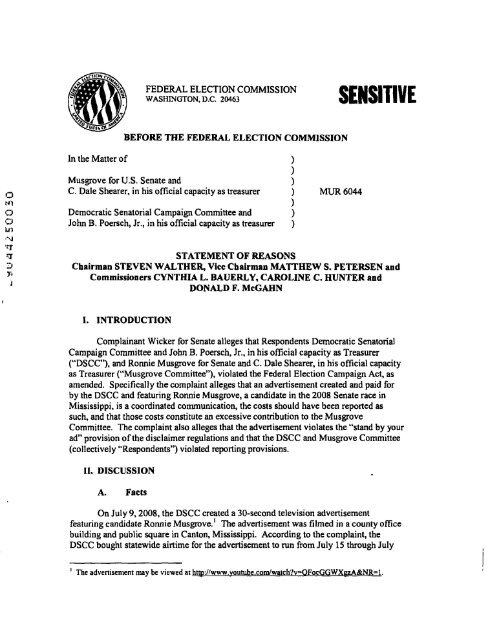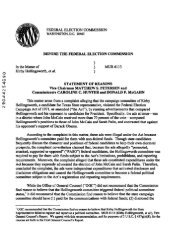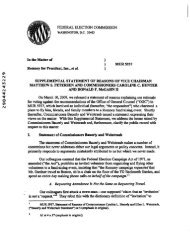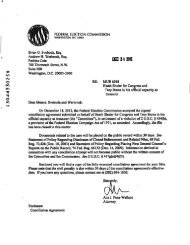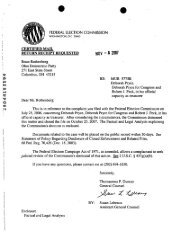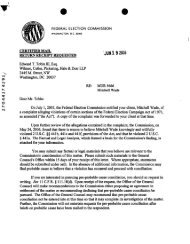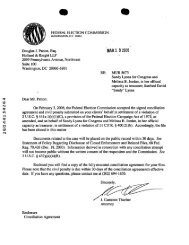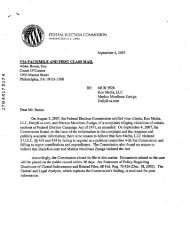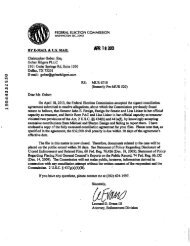Statement of Reasons
Statement of Reasons
Statement of Reasons
You also want an ePaper? Increase the reach of your titles
YUMPU automatically turns print PDFs into web optimized ePapers that Google loves.
FEDERAL ELECTION COMMISSION QCIIC1T1UCWASHINGTON, D.C. 20463 OCROI 111LBEFORE THE FEDERAL ELECTION COMMISSIONIn the Matter <strong>of</strong> )Musgrove for U.S. Senate and )C. Dale Shearer, in his <strong>of</strong>ficial capacity as treasurer ) MUR 6044Democratic Senatorial Campaign Committee and )John B. Poersch, Jr., in his <strong>of</strong>ficial capacity as treasurer )STATEMENT OF REASONSChairman STEVEN WALTHER, Vice Chairman MATTHEW S. PETERSEN andCommissioners CYNTHIA L. BAUERLY, CAROLINE C. HUNTER andDONALD F. McGAHNI. INTRODUCTIONComplainant Wicker for Senate alleges that Respondents Democratic SenatorialCampaign Committee and John B. Poersch, Jr., in his <strong>of</strong>ficial capacity as Treasurer("DSCC"), and Ronnie Musgrove for Senate and C. Dale Shearer, in his <strong>of</strong>ficial capacityas Treasurer ("Musgrove Committee"), violated the Federal Election Campaign Act, asamended. Specifically the complaint alleges that an advertisement created and paid forby the DSCC and featuring Ronnie Musgrove, a candidate in the 2008 Senate race inMississippi, is a coordinated communication, the costs should have been reported assuch, and that those costs constitute an excessive contribution to the MusgroveCommittee. The complaint also alleges that the advertisement violates the "stand by yourad" provision <strong>of</strong> the disclaimer regulations and that the DSCC and Musgrove Committee(collectively "Respondents") violated reporting provisions.II. DISCUSSIONA. FactsOn July 9,2008, the DSCC created a 30-second television advertisementfeaturing candidate Ronnie Musgrove.' The advertisement was filmed in a county <strong>of</strong>ficebuilding and public square in Canton, Mississippi. According to the complaint, theDSCC bought statewide airtime for the advertisement to run from July 15 through JulyThe advertisement may be viewed at http:/ / www.voutube.com/watch?v=QFocGGWXezA&NR= 1.
MUR 6044Musgrove for Senate, et al.<strong>Statement</strong> <strong>of</strong> <strong>Reasons</strong>Page 3 <strong>of</strong> 7production and dissemination <strong>of</strong> the advertisement. Respondents further argue that theadvertisement is an issue ad that does not contain express advocacy.B. Party Coordination AnalysisUnder the Act, an expenditure made by any person "in cooperation, consultation,or concert, with, or at the request or suggestion <strong>of</strong>, a candidate, his authorized politicalcommittees or their agents" constitutes an in-kind contribution. 2 U.S.C.§ 441 a(a)(7)(B)(i). A political party communication is coordinated with a candidate, acandidate's authorized committee, or agent <strong>of</strong> the candidate or committee when thecommunication satisfies the three-pronged test set forth in 11 C.F.R. § 109.37: (1) thecommunication is paid for by a political party committee or its agent; (2) thecommunication satisfies at least one <strong>of</strong> the content standards set forth in 11 C.F.R.§ 109.37(a)(2); and (3) the communication satisfies at least one <strong>of</strong> the conduct standardsset forth in 11 C.F.R. § 109.21(d).The payment by a political party committee for a communication that iscoordinated with a candidate must be treated by the political party committee making thepayment as either an in-kind contribution to the candidate with whom it was coordinatedor a coordinated party expenditure. 11 C.F.R. § 109.37(b). The costs <strong>of</strong> a coordinatedcommunication must not exceed a political committee's applicable contribution orexpenditure limits set forth in the Act; specifically, the DSCC could not contribute morethan S5,000 to, or make more than $180,800 in coordinated party expenditures on behalf<strong>of</strong>, the Musgrove Committee. See 2 U.S.C. §§ 441a(a)(2)(A), 441a(d)(3)(A). Inaddition, the Musgrove Committee may not knowingly accept an excessive contribution.See 2 U.S.C. §441a(f).The only aspect <strong>of</strong> the coordination regulation in dispute is the content prong,which, in relevant part, is satisfied if there is a public communication that "disseminates,distributes, or republishes, in whole or in part, campaign materials prepared by acandidate, the candidate's authorized committee or an agent <strong>of</strong> any <strong>of</strong> the foregoing" orthat "expressly advocates the election or defeat <strong>of</strong> a clearly identified candidate forFederal <strong>of</strong>fice." 11 C.F.R. § 109.37(a)(2)(i) and (ii). 21. Republi cationThe complaint's basis for alleging that respondents republished campaignmaterial is Musgrove's appearance in the advertisement. The complaint states thatMusgrove's active participation in the filming <strong>of</strong> the advertisement with the DSCCconstitutes coordination in the form <strong>of</strong> republication <strong>of</strong> campaign materials. SeeComplaint at 1-2.2 Subpart iii <strong>of</strong> the content prong <strong>of</strong> the coordinated communication regulation is not applicable herebecause the DSCC advertisement aired more than 90 days before the general election. See 11 C.F.R.§ 109.37(a)(2)(iii).
MUR 6044Musgrove for Senate, et al.<strong>Statement</strong> <strong>of</strong> <strong>Reasons</strong>Page 4 <strong>of</strong>7Respondents argue that they did not republish campaign material because theadvertisement consisted <strong>of</strong> all new script and footage created by the DSCC, not theMusgrove Committee. They argue that "republication <strong>of</strong> campaign materials" as requiredby the regulation covers existing campaign material emanating from the campaign andthat Musgrove's appearance in the advertisement does not convert it to campaignmaterial.The content prong <strong>of</strong> the coordinated communication regulation is satisfied by a"public communication that disseminates, distributes, or republishes, in whole or in part,campaign materials prepared by a candidate, the candidate's authorized committee, or anagent <strong>of</strong> any <strong>of</strong> the foregoing." 11 C.F.R. § 109.37(a)(2)(i). Because the material at issuein this matter was produced by the DSCC, the DSCC did not republish campaignmaterial. 3 Therefore, there is no basis to find reason to believe that the advertisementconstitutes a coordinated communication based on the dissemination, distribution orrepublication <strong>of</strong> campaign materials standard <strong>of</strong> the content prong.2. Express AdvocacyThe complaint also argues that the advertisement expressly advocates Musgrove'selection and, thus, satisfies the express advocacy standard <strong>of</strong> the content prong. See11 C.F.R. § 109.37(a)(2)(ii). The complaint's basis for this allegation is "theadvertisement's very contents, and specifically by Musgrove's own role in the ad."Respondents claim that the advertisement is an issue ad about balanced budgets andwasteful spending and does not contain words such as "vote for," "elect," "vote against,"or "defeat" any candidate. According to respondents, the sole call to action in theadvertisement asks viewers to telephone Congress, and the advertisement provides aphone number for doing so.Under the Commission's regulations, a communication contains express advocacywhen it uses phrases such as "vote for the President," "re-elect your Congressman," or"Smith for Congress," or uses campaign slogans or words that in context have no otherreasonable meaning than to urge the election or defeat <strong>of</strong> one or more clearly identifiedcandidates, such as posters, bumper stickers, or advertisements that say, "Nixon's theOne," "Carter'76," "Reagan/Bush," or "Mondale!" See \IC.F.R. § 100.22(a).Respondents argue that the advertisement does not contain language that qualifies asexpress advocacy under 11 C.F.R. § 100.22(a). We agree.The Commission's regulations further provide that express advocacy includes anycommunication containing an "electoral portion" that is "unmistakable, unambiguous,and suggestive <strong>of</strong> only one meaning" and about which "reasonable minds could not differ' Prior MURs including an analysis <strong>of</strong> republication have involved pre-existing material belonging to oremanating from the campaign. See. e.g.. MUR 5743 (Betty Sutton for Congress) (photograph obtainedfrom campaign): MUR 5672 (Save American Jobs Assoc.) (video broadcast on association's website wasoriginally produced and used by candidate's campaign).
MUR 6044Musgrovc for Senate, et al.<strong>Statement</strong> <strong>of</strong> <strong>Reasons</strong>Page 5 <strong>of</strong> 7as to whether it encourages actions to elect or defeat" a candidate when taken as a wholeand with limited reference to external events, such as the proximity to the election. See11 C.F.R. § 100.22(b). In its discussion <strong>of</strong> then-newly promulgated section 100.22, theCommission stated that "communications discussing or commenting on a candidate'scharacter, qualifications or accomplishments are considered express advocacy under newsection 100.22(b) if, in context, they have no other reasonable meaning than to encourageactions to elect or defeat the candidate in question." See Explanation and Justification forExpress Advocacy, et a/., 60 Fed. Reg. 35292, 35295 (July 6,1995).Respondents argue that the advertisement does not fall into 11 C.F.R § 100.22(b)because its call to action "unambiguously asks viewers to call Congress and expresssupport" for a legislative agenda. Response at 5. Even though the advertisement toutsMusgrove's qualifications and accomplishments as Mississippi's former governorregarding his fiscal policies and does not ask Musgrove to take or keep a position on anissue, the advertisement concludes by asking viewers to "call Congress" and "tell them tostart balancing the budget," so it could be read to highlight Musgrove's accomplishmentsas governor <strong>of</strong> Mississippi as an example that current Congressional legislators shouldfollow. Taken as a whole, reasonable minds could differ as to whether the advertisementencourages actions to elect Musgrove. Thus, the advertisement does not qualify asexpress advocacy under § 100.22(b).In sum, the DSCC advertisement does not constitute a coordinatedcommunication because it does not disseminate, distribute or republish campaignmaterial prepared by a candidate, and it does not expressly advocate Musgrove's election.Therefore, we found that there is no reason to believe that the DSCC violated 2 U.S.C. §441 a(d) or the Musgrove Committee violated 2 U.S.C. § 441a(f).C. Reporting ViolationThe complaint alleges that the respondents failed to disclose "such coordinationor contribution(s)." Because the advertisement is not a coordinated party expenditure bythe DSCC or an in-kind contribution to Musgrove, the respondents did not commit anyreporting violations. Therefore, we found that there is no reason to believe the DSCC orthe Musgrove Committee violated 2 U.S.C. § 434(b).D. Disclaimer ViolationThe complaint alleges that Respondents violated the Act by failing to include anaccurate disclaimer. Musgrove's appearance in the advertisement raises the issue <strong>of</strong>whether he authorized the advertisement. Section 441d(a)(2) <strong>of</strong> the Act provides,"Whenever a political committee makes a disbursement for the purpose <strong>of</strong> financing anycommunication through any broadcasting station ... such communication - if paid for byother persons but authorized by a candidate, an authorized political committee <strong>of</strong> acandidate, or its agents, shall clearly state that the communication is paid for by suchother persons and authorized by such authorized political committee." In addition, "Any
MUR 6044Musgrove for Senate, et al.<strong>Statement</strong> <strong>of</strong> <strong>Reasons</strong>Page 6 <strong>of</strong> 7[such] communication which is transmitted through television shall include, in addition tothe [above] requirements ... a statement that identifies the candidate and states that thecandidate has approved the communication." See2\].S.C. § 441d(d)(l)(B).The advertisement correctly discloses that the DSCC paid for it. Although itappears that Musgrove consented to be filmed and willingly participated in the filming <strong>of</strong>the advertisement, (1) he did not have a speaking part; (2) there is no indication that hereviewed the advertisement and approved it before it was broadcast; and, as noted above,(3) this was not a coordinated communication between the Musgrove Committee and theDSCC. Respondents state that the ad was created, produced and aired by the DSCC.There is no basis on which to determine that Musgrove authorized the advertisement.Based on these facts, we conclude that there are insufficient grounds to justify the use <strong>of</strong>additional Commission resources to investigate whether the candidate authorized the adsuch that the DSCC should have included authorization and approval statements in itsdisclaimer.O
MUR 6044Musgrove for Senate, et al.<strong>Statement</strong> <strong>of</strong> <strong>Reasons</strong>Page 7 <strong>of</strong> 7DateHi ftSteven T. WaltherChairmanu'?DateMatthew S. PetersenVice ChairmanOC-i* jDateCynthWL. BauerlyCommissionerGDate01•' C. A/-Caroline C. HunterCommissionerDatDonald F. McGahn 11Commissioner


